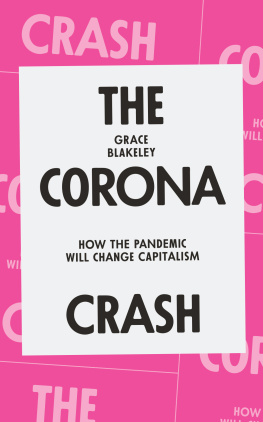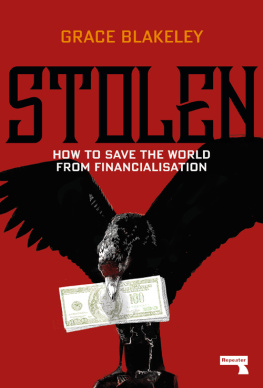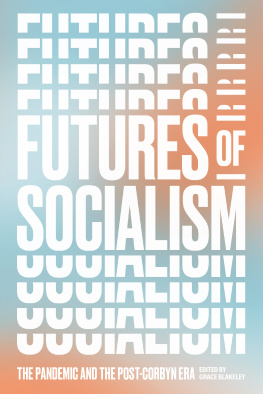Grace Blakeley - The Corona Crash: How the Pandemic Will Change Capitalism (CoronaVirus Pamphlets)
Here you can read online Grace Blakeley - The Corona Crash: How the Pandemic Will Change Capitalism (CoronaVirus Pamphlets) full text of the book (entire story) in english for free. Download pdf and epub, get meaning, cover and reviews about this ebook. year: 2020, publisher: Verso Books, genre: Politics. Description of the work, (preface) as well as reviews are available. Best literature library LitArk.com created for fans of good reading and offers a wide selection of genres:
Romance novel
Science fiction
Adventure
Detective
Science
History
Home and family
Prose
Art
Politics
Computer
Non-fiction
Religion
Business
Children
Humor
Choose a favorite category and find really read worthwhile books. Enjoy immersion in the world of imagination, feel the emotions of the characters or learn something new for yourself, make an fascinating discovery.
- Book:The Corona Crash: How the Pandemic Will Change Capitalism (CoronaVirus Pamphlets)
- Author:
- Publisher:Verso Books
- Genre:
- Year:2020
- Rating:3 / 5
- Favourites:Add to favourites
- Your mark:
- 60
- 1
- 2
- 3
- 4
- 5
The Corona Crash: How the Pandemic Will Change Capitalism (CoronaVirus Pamphlets): summary, description and annotation
We offer to read an annotation, description, summary or preface (depends on what the author of the book "The Corona Crash: How the Pandemic Will Change Capitalism (CoronaVirus Pamphlets)" wrote himself). If you haven't found the necessary information about the book — write in the comments, we will try to find it.
Grace Blakeley: author's other books
Who wrote The Corona Crash: How the Pandemic Will Change Capitalism (CoronaVirus Pamphlets)? Find out the surname, the name of the author of the book and a list of all author's works by series.
The Corona Crash: How the Pandemic Will Change Capitalism (CoronaVirus Pamphlets) — read online for free the complete book (whole text) full work
Below is the text of the book, divided by pages. System saving the place of the last page read, allows you to conveniently read the book "The Corona Crash: How the Pandemic Will Change Capitalism (CoronaVirus Pamphlets)" online for free, without having to search again every time where you left off. Put a bookmark, and you can go to the page where you finished reading at any time.
Font size:
Interval:
Bookmark:

The Corona Crash
The Corona Crash
How the Pandemic
Will Change Capitalism
Grace Blakeley

First published by Verso 2020
Grace Blakeley 2020
All rights reserved
The moral rights of the author have been asserted
1 3 5 7 9 10 8 6 4 2
Verso
UK: 6 Meard Street, London W1F 0EG
US: 20 Jay Street, Suite 1010, Brooklyn, NY 11201
versobooks.com
Verso is the imprint of New Left Books
ISBN-13: 978-1-83976-205-5
ISBN-13: 978-1-83976-206-2 (UK EBK)
ISBN-13: 978-1-83976-207-9 (US EBK)
British Library Cataloguing in Publication Data
A catalogue record for this book is
available from the British Library
Library of Congress Cataloging-in-Publication Data
A catalog record for this book is available
from the Library of Congress
Typeset in Sabon MT by Hewer Text UK Ltd, Edinburgh
Printed and bound by CPI Group (UK) Ltd, Croydon CR0 4YY
Contents
Few could have imagined that 2020 would be the year the world entered a new phase of capitalism, as the links between states, banks and the worlds biggest corporations become so tight that they seem to fuse entirely. The stagnation of the past decade represented the death knell of the speculative mania that characterised the era of financialisation, which collapsed under the weight of its own excesses in 2008. Amid the pandemic, we have witnessed its replacement state monopoly capitalism begin to emerge.
Within weeks of the declaration of a pandemic by the World Health Organisation on 11 March, it became clear that the public health emergency would cause widespread economic devastation. There were three quarters of a million confirmed cases of Covid-19 by the end of March and the constraints on ordinary economic activity imposed in response to its spread had brought the global economy to a standstill.
The Great Lockdown as the coordinated stay-at-home and social-distancing measures imposed by many states around the world have been termed had an immediate impact on the labour market, output, incomes and consumption. Stock markets plummeted more than during any other recent crisis. The S&P and the Dow Jones saw some of their largest one-day falls in history. Falling stock prices reflected investors realisation that, with factories closed, borders shut and consumption and investment both collapsing, the global economy was headed into a deep recession. After a decade of rising corporate debt, the big worry was that falling corporate incomes would cause a cascade of corporate bankruptcies that could threaten some major financial institutions.
But despite all this, by June the Great Lockdown was being eased, stock markets had recovered most of their losses and commentators began once again to talk up the likelihood of a V-shaped recovery. There is always a point in the middle of a crisis when people convince themselves that the worst is over call it the eye of the storm. The FTSE 100 rallied in the immediate aftermath of the run on Northern Rock in 2007, even though it was obvious by that point that many other banks were just as vulnerable to a deterioration in credit conditions. After the first wave of the Spanish flu in 1918, people convinced themselves that the worst was over, only to be hit with another, more severe wave just a few months later.
It seems clear that, at the time of this writing, the global economy is in the eye of the Covid-19 storm. Deaths around the world continue to mount, and while many countries are managing safely to reopen their economies by stepping up testing and tracing measures, others are ending lockdown without any plans whatsoever. Until a vaccine is found, we cannot dismiss the possibility that the world will face further waves of the virus that will require a recommencement of lockdown measures.
Whats more, the virus is now spreading to new parts of the global economy. As Kim Moody pointed out in an essay for the journal Spectre, the coronavirus initially spread through the veins and arteries of the worlds trade system: it began in Wuhan, a global centre of commodity production, before making its way through commercial hubs in East Asia, commodities exporters in the Middle East and Latin America, and the centres of global consumption in Europe and North America.
From London, Washington and New York, the virus spread to the hinterlands of the economies of the imperial core, leading to new outbreaks in the Midlands of the UK and the southern states of the US. And while initially protected due to its peripheral position in the world capitalist system, sub-Saharan Africa is now seeing an increase in cases, emanating from trading centres in Nigeria and South Africa. Public health experts have long been warning of the catastrophic impact the virus could have if it begins to spread quickly in the poorest countries in the Global South. Many of these states are already suffering from deep debt distress, with governments being forced to choose between servicing their obligations to creditors and purchasing ventilators and protective equipment for medical staff.
But it is not just in the Global South that the preexisting weaknesses created by uneven, financialised capitalist development are about to be exacerbated by the pandemic. So far, debt-laden economies in the Global North like the US, the UK and Ireland have managed to avoid a financial crisis as a result of the pandemic but a senior official at the Federal Reserve has warned that looming bankruptcies could still trigger one.
Governments have stepped in to defer consumer loan and credit card payments, act as guarantor for bank lending to small businesses, and pump almost unlimited liquidity into their domestic corporate sectors, which were already over-leveraged before the pandemic struck. But each of these measures rests on the assumption that firms and households will ultimately be able to repay the loans. If the problem is simply that consumers and businesses are struggling to access cash, then this would be the sensible option. But if we are headed for a depression in which many of them will barely be able to cover their bottom lines, let alone repay all their debts, then all the new lending in the world wont make a difference.
The fact that banks coordinating the governments bounceback loan scheme in the UK have already stated that between 40 to 50 per cent of the small businesses receiving these loans will default when the scheme ends warns of trouble to come.
How will struggling businesses and unemployed consumers be able to honour their obligations to creditors if they arent earning? And if they dont honour their obligations, who will pick up the slack? Will the state write off loans and force the banks that issued the debt to take a hit? Or will the pain be forced onto workers and small and medium-sized businesses, while investors in the corporate sector remain hooked up to government life support in perpetuity?
We have no answers to any of these questions, and the fact that the governments of the US and the UK seem to be making things up as they go along does not make it any easier to guess. In the context of this dramatic almost unprecedented uncertainty, the optimism of the summer months of 2020 is, at some point, likely to give way to a self-reinforcing cycle of pessimism. Although much depends on the policy response, societies around the world are facing mass unemployment, falling incomes and widespread corporate and personal defaults. Far from a V-shaped recession, it will probably take years for the economy to recover to pre-crisis output levels. The UKs services-dependent economy is expected to be the worst hit within the OECD.
Font size:
Interval:
Bookmark:
Similar books «The Corona Crash: How the Pandemic Will Change Capitalism (CoronaVirus Pamphlets)»
Look at similar books to The Corona Crash: How the Pandemic Will Change Capitalism (CoronaVirus Pamphlets). We have selected literature similar in name and meaning in the hope of providing readers with more options to find new, interesting, not yet read works.
Discussion, reviews of the book The Corona Crash: How the Pandemic Will Change Capitalism (CoronaVirus Pamphlets) and just readers' own opinions. Leave your comments, write what you think about the work, its meaning or the main characters. Specify what exactly you liked and what you didn't like, and why you think so.









